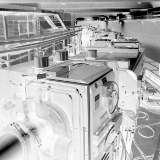Dr
Stephen Hogan
(University College London)
06/08/2015, 14:00
Invited Talk
In its triplet ground state the positronium (Ps) atom self-annihilates on a timescale of 142 ns [1]. This short lifetime rules out the possibility of performing tests of antimatter gravity using ground state Ps atoms. However, when excited to Rydberg states with high principal quantum number [2], direct self-annihilation can become negligible and the Ps lifetime is dominated by radiative...
Michael Charlton
(Swansea University)
06/08/2015, 14:30
Invited Talk
The creation of tunable beams of positronium atoms using the optical dipole force from short, pulsed accelerating optical lattices has been studied. Using the favourable polarizability-to-mass ratio of positronium we show that accelerations in excess of 1014g are possible. Simulations have been performed for several cases in which lattice beams capture a significant fraction of ground state...
Philippe Braunig
(Ruprecht-Karls-Universitaet Heidelberg (DE))
06/08/2015, 15:00
Invited Talk
The field of atom optics has seen tremendous development during the past decades. Tools and methods from this field have evolved from proof-of-principle experiments to reliable instruments with unprecedented precision and are now utilized to tackle fundamental questions – also in different fields of physics. The AEgIS collaboration has used such a tool known as moiré deflectometer, an...
